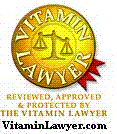"Supporting Industry Compliance with FDA and FTC Regulations."
Page Index:
· Weight Loss Red Flags
· Certificates of Export
· VLC Seal
· Dry Test Markeing
· cGMPs - SOPs
· Bioterrorism
· Links
· Contact Me
· Top
The Vitamin Lawyer Consultancy
www.vitaminlawyer.com
Ralph Fucetola JD
| Dealing with the FDA and FTC |
Table Index:FDARED FLAG WORDSThese are the "dirty (half) dozen" words that will get you noticed by the Government -- " diagnose, prescribe, treat, prevent, mitigate and cure" -- but, my complete proprietary list of allowed and disallowed terms is four pages long... Services...FTC RED FLAG CLAIMSSee Vitamin Lawyer News for Red Flag Weight Loss Claims - updated. What to do if you are raided by the FDA or FTC*It's sad to say, but there is not much you can do after the raid has begun...But, a good Disclaimer Page can help! What to expect from a SURPRISE FDA inspection: fdainspection.htm * Early in 2000 the White House announced a ten million dollar "initiative" to pay for closer FDA/FTC scrutiny of internet nutrient purveyors... when is your turn? FDA and FTC Vitamin Law NewsSome of the latest information from FTC and FDA including important information on the FDA Structure / Function Claims and Health Claims filing Rules. www.vitaminlawyernews.com. From Vitamin Lawyer News -
NEW FDA "Science Based Initiative" -
FDA Press
Release - 07/10/03
FDA Issues Statement on Increased Enforcement -
FDA Statement
- 06/30/03 Exporting Dietary Supplements - Certificates of ExportFDA provides Certificates of Export for dietary supplements (and the other products it regulates). Full details are at http://www.cfsan.fda.gov/~lrd/certifi3.html. General information on Imports and Exports is at http://www.cfsan.fda.gov/~lrd/imports.html "Dry" Test Marketing - the Rules for test marketing products. FDA Allows Qualified Health Claims"FDA's 2003 Consumer Health Information for
Better Nutrition Initiative provides for the use of qualified health claims when
there is emerging evidence for a relationship between a food, food component, or
dietary supplement and a reduced risk of a disease or health-related condition.
In this case, the evidence is not well enough established to meet the
significant scientific agreement standard required for FDA to issue an
authorizing regulation. Qualifying language is included as part of the claim to
indicate that the evidence supporting the claim is limited. Both conventional
foods and dietary supplements may use qualified health claims. FDA uses its
enforcement discretion for qualified health claims after evaluating and ranking
the quality and strength of the totality of the scientific evidence. Also, FDA
now has a process for the public to view qualified health claim petitions,
comment on these petitions, and submit comments on these petitions through its
web site." For a discussion of the distinction among General Wellness, Structure & Function and Health Claims, see Labeling Rules Opinion Letter. On August 28, 2003, FDA
published a proposed and companion direct final rule on ingredient labeling of
dietary supplements that contain botanicals. FDA is proposing to amend its
regulation on declaring botanical ingredients in dietary supplements to
incorporate by reference the 2000 editions of Herbs of Commerce and the
International Code of Botanical Nomenclature (Saint Louis Code). FTC WARNING ON SUPPLEMENT CLAIMS!FTC states, "supplement marketers are cautioned that the FTC will require both strong scientific support and careful presentation for... claims. *** Supplement marketers should ensure that anyone involved in promoting products is familiar with basic FTC advertising principles. The FTC has taken action not just against supplement manufacturers, but also, in appropriate circumstances, against ad agencies, distributors, retailers, catalog companies, infomercial producers and others involved in deceptive promotions. Therefore, all parties who participate directly or indirectly in the marketing of dietary supplements have an obligation to make sure that claims are presented truthfully and to check the adequacy of the support behind those claims." FTC Guidance, http://www3.ftc.gov/bcp/conline/pubs/buspubs/dietsupp.htm.
Good Manufacturing Practices Latest Information: Outline of SOPs What can you do to prepare? - Ask me! Original 2003 Report: vitfdacgmpreport.htm Question and Answer from the Vitamin Lawyer Q: "> ...if there were a solution for this and
documentation other than anecdotal evidence, A: "... Your note betrays a typical
misunderstanding about how claims are allowed to be made for health care
products under US law. Both FDA and FTC rules have something to teach us
about this. December 11, 2003 Some Additional Links:Structure & Function Claims Notice Procedure,
claimnotice.html FTC DS Ad Guide, http://www.ftc.gov/bcp/edu/pubs/business/adv/bus09.shtm Facility Registration, http://www.cfsan.fda.gov/~furls/cpgreg2.html DSHEA: the basic law, http://www.cfsan.fda.gov/~dms/dietsupp.html Some Label Content Considerations FDA - Consolidated Institutional Review Board
Guidance: FDA - New Label Claims Page:
http://www.cfsan.fda.gov/~dms/lab-hlth.html FDA - OTC Labeling Overview (not Dietary
Supplements) FTC - Complying with the Telemarketing Sales
Rule, FTC - Fair Credit Billing Act (FCBA). FTC - Lost or Stolen Cards, http://www3.ftc.gov/bcp/conline/pubs/credit/atmcard.htm FTC - Fair Credit Reporting Act, http://www3.ftc.gov/os/statutes/fcra.htm FTC - Consumer Guide to E-payments, http://www3.ftc.gov/bcp/conline/pubs/online/payments.htm FTC on internet pharmacies,
http://www.ftc.gov/os/2003/03/030327internetprescriptions.pdf FTC Weight Loss Claims Guidance, http://www.ftc.gov/bcp/conline/edcams/redflag/index.html FDA Bioterrorism Preparedness Guide, http://www.cfsan.fda.gov/~pn/cpgpn.html FTC Testimonial Use Guide, http://www.ftc.gov/bcp/guides/endorse.htm FDA Device Advice, http://www.fda.gov/cdrh/devadvice/ide/index.shtml Food Allergen Labeling Law, http://www.cfsan.fda.gov/~dms/alrgact.html Homeopathic Remedies, http://www.fda.gov/ora/compliance_ref/cpg/cpgdrg/cpg400-400.html FDA Small Entity Label & Claim Guidance, http://www.cfsan.fda.gov/~dms/ds-label.html FDA Qualified Health Claims, http://www.cfsan.fda.gov/~dms/lab-qhc.html FDA Dietary Supplement Guidance Documents, http://www.cfsan.fda.gov/~dms/guidance.html#ds FDA Certificate of Free Sale, http://www.cfsan.fda.gov/~dms/ds-cert.html FDA Guidance on Qualified Health Claims, http://www.cfsan.fda.gov/~dms/qhcqagui.html General FDA Guidance Document Index, http://www.cfsan.fda.gov/~dms/guidance.html Bioterrorism Act, http://www.fda.gov/oc/bioterrorism/bioact.html Labeling & Internet Advertising, http://www.cfsan.fda.gov/~dms/labwww.html Homeopathic Products Marketing Guide, http://www.fda.gov/ora/compliance_ref/cpg/cpgdrg/cpg400-400.html Is it a cosmetic, a drug, or both (or is it a soap?) - http://www.cfsan.fda.gov/~dms/cos-218.html Functional Foods Labeling & Claims Guidance - http://www.cfsan.fda.gov/~dms/flguid.html GRAS FAQs - http://www.cfsan.fda.gov/~dms/grasguid.html New Dietary Ingredients - http://www.cfsan.fda.gov/~dms/ds-ingrd.html Label Guideline (2005) http://www.cfsan.fda.gov/~dms/dslg-1.html Substantiation Guideline: http://www.cfsan.fda.gov/~dms/dsclmgu2.html - December 2008 AER Label Guideline: http://www.cfsan.fda.gov/~dms/dsaergu3.html - December 2008 Vitamin Lawyer News - regular updates - www.vitaminlawyernews.com Back to Vitamin Lawyer Consultancy: www.vitaminlawyer.com
|
Breaking News!
Vitamin Lawyer News
Updated Often!
|
cGMPs & SoPs are Coming to the Vitamin
Industry! |
Vitamin Lawyer On Line Seminar - FREE!
Ralph Fucetola JD
Email me with questions: |
Look for the Vitamin Lawyer Oversight Seal of Approval on Nutrient Web Sites
|
|
Your web site needs a proper SUS |
|
SUPPORT LIFESPIRIT This site hosted on the net by LifeSpirit Center This site makes no representations regarding these offers. |
© 2007
Powered by
counter.bloke.com
![]()
Web Site Index:
·
Home
Page
·
Credentials
·
Services
·
Payments
·
SOPs
·
SUS
·
Forming a Company
·
Vitamin Lawyer News
·
FDA - FTC Regs
·
Links
·
International Services
·
Nutrient Picks
·
Consumers
·
Personal Importation
·
Professional Seminars
·
FREE
Online Seminar
·
Vaccine Choice
·
Site Use Statement
·
Site Map
·
Top
·
Home
Page
·
Credentials
·
Services
·
Payments
·
Oversight Seal ·
Site Use Statement
·
Top

